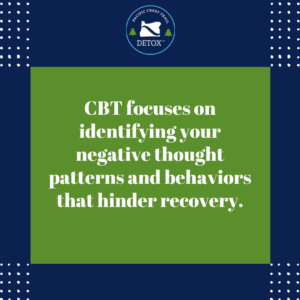Detox is a medically supervised process that eliminates toxins, drugs, and alcohol from your system.
While detox is crucial for starting your recovery, it is only the first step. Ongoing treatment, such as therapy and counseling, is essential to ensure sobriety. You have to learn how to manage your cravings, build healthy coping mechanisms, and address your triggers.
The Role Of Detox
Detoxification, or detox, is the first phase of recovery from substance abuse. It involves safely eliminating drugs or alcohol from your body. This process typically occurs with the help of prescribed medications.
These medications manage your withdrawal symptoms throughout your detox period. They are important because you may experience discomfort or medical complications while your body adjusts without the substances.

What Does Detox Accomplish?
The goal of detox is to stabilize your physical health while substances exit your body. During this phase, your healthcare professionals will be around to address your immediate withdrawal symptoms. This prevents the onset of dangerous complications.
Additionally, detox provides you with a structured environment that’s clear of temptations from drugs or alcohol.
Limitations Of Detox Without Further Treatment
While detox is essential for physical recovery, it has its limitations. For instance, detox doesn’t address underlying psychological and emotional factors involved in your addiction. You’ll likely continue to face cravings, triggers, and unhealthy coping mechanisms.
As a result, your risks of relapse may be higher without further treatment.

Immediate Steps After Detox
To immediately address the psychological and emotional contributors to your addiction, here are some steps you can take:
Consulting Healthcare Professionals For Evaluation
A thorough evaluation by an experienced detox team is essential because the results dictate the proper approaches for your case. The main purposes of this evaluation are the following:
- Identifying underlying health conditions. Conditions such as depression and anxiety often co-occur with substance abuse, these must be considered in your treatment plans.
- Assessing your overall health. Your physical and psychological well-being can determine the amount and form of care and support you need during recovery.
- Developing a treatment plan. Information gathered from your evaluation will likely be used to create a personalized recovery plan just for you.
Creating A Personalized Recovery Plan
It’s important to have a recovery plan that’s specifically tailored to your needs during the remainder of your substance abuse treatment. The key factors are the following:
- Substance abuse history. When you’re capable, estimate the substances and duration of your substance use to discuss with professionals. Remember that honesty is key.
- Medical and mental health conditions. The underlying health issues that you’ve consulted for can greatly impact your treatment options and recovery outcomes.
- Personal goals and preferences. The most suitable treatment path is one that aligns with your recovery goals. Reflect on the top ones you’d like to achieve.
Treatment Options Post-Detox
There are several treatment options available to help sustain your recovery after detox. The most common ones are:
Inpatient Rehabilitation
Inpatient rehab provides you with intensive and structured treatment in a residential recovery setting. It typically involves constant medical supervision, therapy sessions, and peer support. Inpatient care is most suitable if you have a severe addiction, co-occurring mental health disorders, or reside in destructive environments.
Outpatient Rehabilitation
Outpatient rehab allows you to continue your typical life responsibilities while you receive treatment. It’s flexible and is suitable if you have a more stable living environment and strong support systems. Outpatient programs vary from part-time counseling to an intensive outpatient program.
Intensive outpatient programs involve a few hours of structured care per week, after which you return to your typical routines.
Therapeutic Approaches
Therapy addresses the underlying causes of your addiction and helps you develop healthier coping mechanisms. The most common therapeutic approaches are:
Individual Therapy
Individual therapy is a one-on-one counseling approach. It provides you with a safe space to explore your personal challenges and current coping strategies. This mode allows you to build stronger relationships with your mental health professionals and personalized treatment plans.
Cognitive Behavioral Therapy (CBT)
Cognitive behavioral therapy, or CBT, focuses on identifying your negative thought patterns and behaviors that hinder recovery. Some negative thought patterns include justifying your drug addiction or that you’re incapable of reaching sobriety.
Through CBT, you’ll learn how to recognize, evaluate, and manage these via techniques such as meditation and journaling.
Dialectical Behavior Therapy (DBT)
Dialectical behavior therapy is suitable if you usually experience intense emotions and struggle to manage them. It’s also suitable if you have co-occurring mental health conditions such as personality disorders, depression, and anxiety. As such, this therapy modality focuses on teaching you emotional regulation, distress tolerance, and interpersonal effectiveness.
Group Therapy
Group therapy offers a safe space to connect with peers undergoing similar experiences. While it can be intimidating, sharing experiences, learning from others, and knowing you aren’t alone can feel very supportive. Being in a group can also help you develop better communication skills and coping mechanisms.
Additionally, being in a group can encourage accountability and goal-setting. You may even make plans to celebrate milestones together.
In Conclusion
Recovery from substance abuse is a challenging feat that requires comprehensive care and support well beyond detox. After all, it’s just as important to address the underlying causes of your addiction. This way, your addiction recovery is healthy, safe, and sustainable.
Regardless of whether you choose an inpatient or outpatient program, there’s a treatment plan specifically made for you. With the right treatment and support, you can overcome addiction and start anew. Remember that it’s never too late.
If you’re looking for detox centers in Portland Oregon to begin your recovery journey, contact us at Pacific Crest Trail Detox today!


